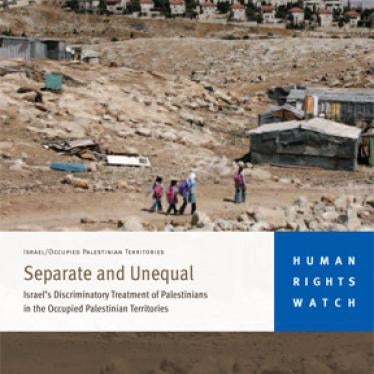What should Europe do about Israel's construction of settlements and destruction of Palestinians' homes and other property on the West Bank? When the Foreign Affairs Council discusses this issue on Monday (14 May), its priority should be to replace the current, incoherent approach with a strategy based on clear principles.
Europe provides millions of euros in humanitarian aid to Palestinians harmed by Israel's settlement policies. These same policies have hindered aid efforts: the Israeli military has destroyed European-funded projects, and imposes planning restrictions that have reduced European donors to assisting Palestinians rendered homeless.
At the same time, however, Europe allows some products made in illegal settlements preferential, tariff-free entry to its markets.
EU laws prohibit preferential treatment for goods produced in violation of international law in this way, but Europe allows Israel to bundle goods from illegal settlements with goods from inside Israel, and to ship the whole lot to European markets tariff-free. Rather than clearly stating the actual origins of all its exports, Israel merely provides the originating postal codes. The job of spotting settlement goods is left to importers, yet some settlement goods bear the misleading codes of corporate headquarters inside Israel.
Nor has Europe adequately enforced consumer-protection laws, intended to ensure that people can make informed choices about what they buy, when it comes to labelling settlement products in its markets.
Europe should also insist on Israeli compliance with international humanitarian law when it comes to humanitarian and development aid to Palestinians. The law requires Israel to facilitate, not obstruct, aid to people in occupied territory.
Permit confusion
To provide aid to Palestinians, European donors have generally tried to work within the military ‘planning' regime in force in the part of the West Bank under full Israeli control. The military requires permits for all new constructions and rebuilding. Yet military authorities process permit applications far too slowly, and from 2000 to 2007 denied 94% of Palestinian permit applications.
Structures without permits risk being demolished. In 2011, the military demolished hundreds of Palestinian homes, displacing almost 1,100 people – 60% of whom lived near settlements, the UN found. Israel also destroyed 89 latrines, water cisterns, and wells that Palestinians needed because Israel refused to connect their communities to the water and sewage grids. More than 25% of the structures demolished were internationally funded, with European countries prominent among donors, the UN reported. The demolitions continue to increase.
“Permits shouldn't be needed for humanitarian assistance [involving shelter or other construction] to people in dire circumstances,” a European official recently commented in Jerusalem. “But if we don't get the permits, the military issues demolition orders. They don't immediately implement these orders; they just keep them in the freezer. But we never know when they will put them in the microwave. Then we find that another project has been destroyed.”
In one case, military officials issued demolition orders against German-funded solar panels in southern West Bank communities; they have not destroyed the project, but demolished the home and animal shelters of one of the Palestinian families the panels were intended to benefit, crushing their goats.
Construction policy
Israeli policies on construction in the West Bank areas under its exclusive control are also highly discriminatory. In contrast with the near-total restrictions on Palestinian construction, settlement housing starts were up 20% in 2011, and the Israeli government just retroactively authorised three settlement ‘outposts' that had been illegal even under Israeli laws.
European and other donors have stated that Israeli demolitions make them reluctant to go ahead with expensive Palestinian development projects without the required permits. However, several European-funded projects have waited years for Israeli approvals. Between 1995 and 2011, only four of 30 waste-water treatment projects submitted by Palestinians received Israeli approval, according to the UN.
As a result, instead of long-term development for Palestinians, Europe has repeatedly been reduced to giving emergency assistance, often to communities whose infrastructure the Israeli military has demolished, and Israel demolishes even emergency-assistance projects.
Yet Europe has not systematically objected to the planning regime at the root of these problems. European donors should firmly contest demolitions of their humanitarian projects, which violate Israel's international legal obligations as the occupying power.
It seems self-evident that Europe should not support, and need not acquiesce to policies that violate international law. Yet diplomats say that some governments – the Netherlands, in particular – have consistently blocked needed policy changes on tariffs, labelling and humanitarian and development assistance, saying that they would appear confrontational.
When the Foreign Affairs Council next meets, European politicians should make clear that they will indeed confront violations of international law, and close loopholes that ignore or legitimise them.
Bill Van Esveld is a senior Middle East researcher at Human Rights Watch, based in Jerusalem.







